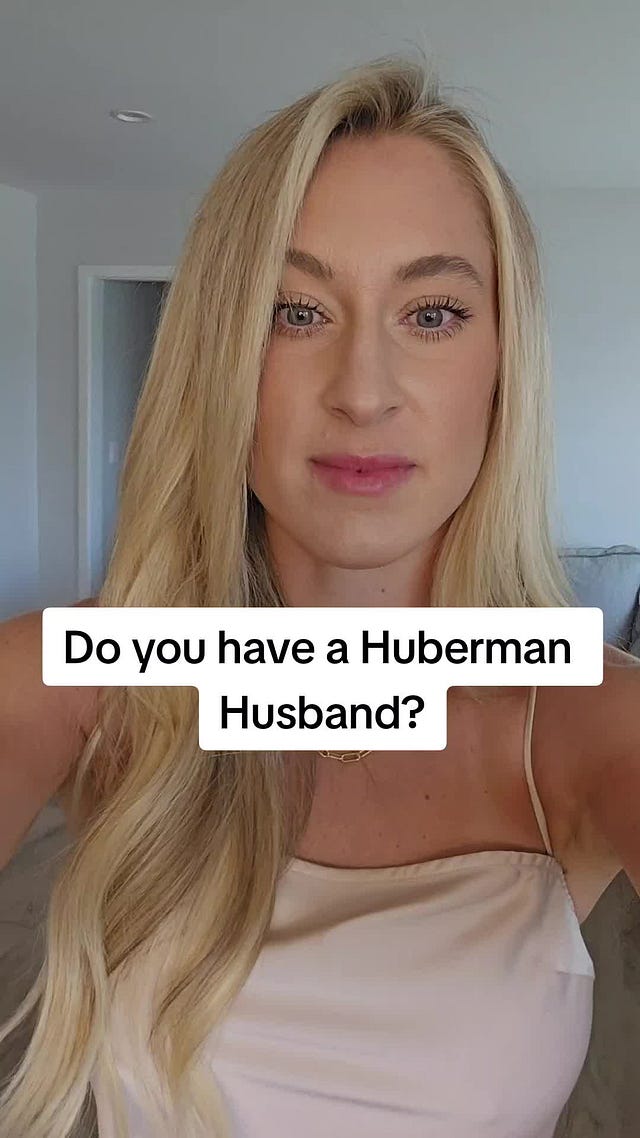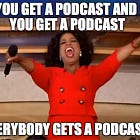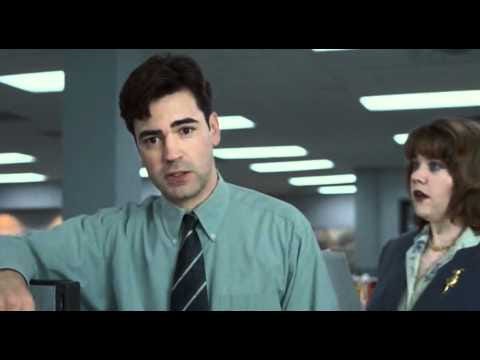💬 Is "Just Be Yourself" Good Career Advice?
Our monthly(ish) community prompt, courtesy of Andrew Huberman and Rick Rubin
Last month, Stanford neuroscientist-turned-chart-topping-podcaster1 Andrew Huberman made appearances on two shows proffering one particular piece of advice that made me spit out my coffee, passed down from music producer and fellow podcaster Rick Rubin:
“Rick has always said the key to being really great at something is to just be you,”2 Huberman recounts of his time spent in Malibu. “Rick’s superpower is the ability to get close to people and feel that thing [that’s unique to them] and pull that out.”
In conversation with Scott Galloway for Prof G, he elaborates on why he thinks he’s been so successful as a podcaster (emphasis mine):
“What I bring forward is an innate desire to learn, organize, and disperse information that I find very useful for mental health, physical health, and performance along those adventures that are just simply my life. I’m just being Andrew Huberman.
I’ll come right out and say, people say all sorts of things. They said all sorts of things about me, good and bad and everything in between. But what I just said, it really describes who I am and my essence. If somebody is an entomologist or works on, I don’t know, like lipid signaling in the gut, or whatever people study, if they can tap into the essence of why they do that, and then teach it from that pure place, they will be potentially the biggest podcast in the world, the best selling book in the world.
So it’s not so much the subject matter as the energy that one brings to it, but that energy, as Rick has pointed out, over and over again, and this is why he’s so successful, cannot be manufactured. Whatever it is that makes you, you, your relationship with your father, your interest in fitness, your appreciation for what young people are now going through and the challenges they face, the desire to, like you’re just being Scott in the world, and that’s why people orient toward you.
And so these colleagues, they’re like, wait, why is it that Huberman and Galloway and [Sam] Harris are like, well, because Sam’s just being Sam. So I think you just, it’s the enthusiasm and energy that one brings to it. And if there’s a universal quality to that, then sure, it will have bigger reach.”
This sounds like great advice, doesn’t it? Just be yourself!
Your truest self, and that’s how you will climb to the top!
I don’t disagree that being yourself is essential: you will attract the right people and repel the wrong ones, and be far happier in the process as you continually seek aligned avenues for expressing your soul’s calling.3
But it seems completely lost on him that all the examples he lists are a very specific type of successful person, at least for climbing the podcasting charts: middle-aged, intellectual, physically fit, white men.
It reminds me of one of the most popular Doh posts: Do What You Love and the Money Will Follow . . . IF (you meet more than 3 of these 20 criteria).
That post was about my dying delulu dream of earning a living via podcasting. My shows were in the top 0.5% and 2.5% of 3.5 million podcasts, and yet that was nowhere near enough downloads to break even with the costs of producing it (to say nothing of the time and energy opportunity costs).
Nine years in, I truly felt I had discovered my zone of genius, and that good things would follow in terms of my ability to sustain this as a core business area. I was being myself! My best self! Wasn’t that enough?
And yet, of the top twenty-five business podcasts on Spotify, only one is currently helmed by a woman.4 In the health category, that figure jumps to five out of the top twenty-five.
So if your goal is to succeed at podcasting, does it work to “just be yourself”?
That ingredient may be necessary, but it is not sufficient. It helps—tremendously—if “being yourself” aligns precisely with what the market wants.
Huberman repeats this advice with Joe Rogan less than a week later, this time at least tossing one (already famous) female podcaster amongst his handful of examples:
“It’s the energy of something that’s new, where people are just being themselves, and they’re not thinking about making a ton of money on a record. A really great producer comes in and captures that energy and rolls it forward. And usually what ends up happening is then the general public falls in love with it.
I really feel like the podcasters—at least some of us—it’s like punk rock, it’s like hip hop, because we’re not thinking about [an agenda]. I wasn’t just going to sit down and like start the Huberman Lab podcast. I was just like, I’ve just got all this stuff in me that I want to tell people because I think it’s super cool. And a lot of it, I think, might also be really useful to them.
And you’re just being you. So when Rick or Lex is just being Lex and or Chris Williamson is just being Chris Williamson or Whitney Cummings is just being Whitney Cummings. So when a podcast works, I think it’s because you’re just being you.
. . . When you can actually just be yourself, people realize, maybe I can be myself too. And people love that, people love that.”
Now I’m dying to know what you think—building on our earlier monthly(ish) Community Doh discussion threads, I’d love to hear from you:5
Is “just be yourself” good career advice?
💬 Sound off in the comments :)
Note: These are for paid subscribers only, so that Dohnuts can feel more secure in sharing, knowing the stories and comments aren’t publicly searchable. I would love for you to join us!
Nowadays, as with most people who rise rapidly toward the sun in our society, you either love him or you hate him: I personally never vibed with his endless monologues. For some, he’s the model for Huberman Husbanding; for others, he’s a near-sociopathic womanizer.
 Tiktok failed to load.
Tiktok failed to load.Enable 3rd party cookies or use another browser
Curiously, even Rick Rubin’s bestselling book, The Creative Act: A Way of Being was ghostwritten by Neil Strauss. He’s not listed on the cover, of course, but he is noted on the inside title page in small italic font at the bottom.
Of course, “the creative act” includes collaboration, it’s just interesting that he left this major detail off the cover and most podcast conversations discussing his writing process.
You’ll love the Penney & Jenny show if you haven’t already listened (with all thanks and credit to her brilliance :) Penney is a longtime friendtor who has written a series of life-changing books on these topics.
Shout-out and kudos to Tori Dunlap, host of Financial Feminist, currently at the #13 spot.
View earlier discussion prompts—and weigh in any time, it’s never too late!—here:
💬 Community Doh: Discussion Prompts
Every six weeks, we open up a discussion thread related to that month’s posts. These comment threads are for paid subscribers only—that means only paying doh’ers can read and reply to comments. Hopefully that gives you an extra dash of courage for sharing your story (as it does for me), knowing they aren’t Google searchable or directly out in public view.
If you enjoyed this post, you might also appreciate:













I agree with your analysis, Jenny.
I also find it repulsive that Andrew Huberman talks about just “being himself” when he’s the kind of person who cheats on his girlfriend (who is going through IVF) with five other women. It’s so disturbing we look up to problematic figures!
On the business side, it doesn’t hold up either. Of course you want to be yourself and be in your zone of strength and be doing something that you are passionate about. But you have to get all the other market fit pieces in place, be able to sell and market effectively, generally visibility and opportunities and so many other things.
I’m disappointed also to learn what Aileen wrote above about Rick Rubin. I’ve always thought he was a really cool cat, which he is creatively, but please, to have such a poor representation of women that he obviously has access to in the creative circles he runs with is pretty disappointing.
I remain optimistic that one can make money from creative endeavors. They just have to be really connected to what the market actually wants to have all the gears running in that direction.
I know I miss your podcasts, but I totally understand why you needed to stop doing them!
I have to say, I don't take any advice from Andrew Huberman, esp in light of his recent controversy. He's always seemed like a "bro" guy to me, and that investigation solidified something I've always sensed.
With respect to Rick Rubin, I have always held him in high regard, admired his work for decades, loved his creativity and way of looking at things and the music he produced. And then he started his podcast. And week after week after week, it was male guest after male guest after male guest. The purpose of his podcast, as he stated, was to follow his inspiration. And it hit me, he's not for me. Because women are not for him. He may work with them, take money from them, etc.., but he doesn't admire them or like them or chose to platform them. Things may have changed at his podcast, idk. I emailed him, I left a review pointing this out (the glaring imbalance between genders etc), but nothing changed, so I stopped following. After 47 episodes (last time I did a full analysis), he had 44 male guests and 3 female guests -- a whole .06% of his guests. In today's age, tell me he can't find more women he admires or whom inspire him? That's a problem.
(And before I hit "post" here, I scanned Rubin's podcast again -- nothing has changed -- very occasionally a female guest, but the others are mostly "bros.")
As I've gotten older, I am definitely more discerning in whom I take advice from and for the most part, if it's a man espousing his advice, I will look elsewhere. He doesn't understand my situation, doesn't know my world, and I know, in this day and age, I can find a woman who is smarter and who does. I will find her.